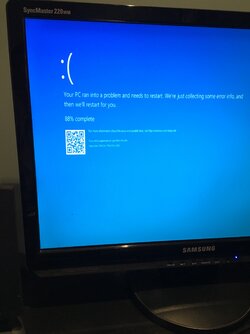- Joined
- Jun 23, 2003
- Location
- Folding in California
I built a desktop for my friend and he's running into BSOD. I did all Windows 10 updates and made sure drivers are updated from Asus website but the BSOD still comes up randomly. Anything else I can test to resolve this for him? Specs are:
ASUS PRIME B250M-PLUS
Intel i5-7400
Team Vulcan 16GB (2 x 8GB) 288-Pin DDR4 SDRAM DDR4 3000 (PC4 24000) Desktop Memory Model TLGD416G3000HC16CDC01
Crucial M4 512GB SSD
Windows 10

ASUS PRIME B250M-PLUS
Intel i5-7400
Team Vulcan 16GB (2 x 8GB) 288-Pin DDR4 SDRAM DDR4 3000 (PC4 24000) Desktop Memory Model TLGD416G3000HC16CDC01
Crucial M4 512GB SSD
Windows 10



